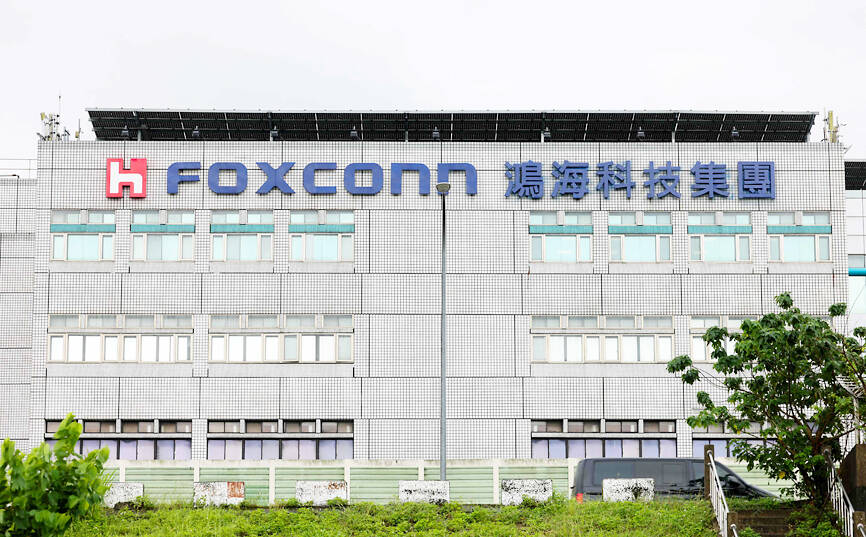Hon Hai Precision Industry Co’s (鴻海精密) annual sales growth slowed last month compared with the previous few months, signaling that tariff-induced uncertainties are affecting electronics demand.
Sales rose 7.25 percent year-on-year to NT$613.87 billion (US$20.5 billion), its slowest growth since January, Hon Hai said in a statement on Tuesday.
Still, last month’s sales were the highest figure for July in the company’s history, Hon Hai said.

Photo: Cheng I-hwa, AFP
Sales in the first seven months of this year totaled NT$4.05 trillion, a 17.62 percent increase from the same period last year and also the highest ever for the period, said the company, also known as Foxconn Technology Group (富士康科技集團).
Analysts were looking for a 12.2 percent increase in third-quarter revenue. Nvidia Corp’s main server assembly partner, Hon Hai, which also assembles Apple Inc’s iPhones, said it expects third-quarter sales to grow sequentially and year-on-year.
However, “the impact of evolving global political and economic conditions, and exchange rate changes, will need continued close monitoring,” Hon Hai said.
Last week, US President Donald Trump set a 20 percent levy on Taiwan’s exports to the US. While electronics are exempt, they might be affected by the outcome of a US investigation under Section 232 of the Trade Expansion Act of 1962, which includes probes into sectors such as semiconductor products.
Still, there might be bright spots for Hon Hai later this year.
The world’s largest tech companies are raising capital spending further this year to keep ahead in an escalating artificial intelligence (AI) race. Microsoft Corp, Amazon.com Inc, Alphabet Inc and Meta Platforms Inc are expected to collectively spend more than US$344 billion this year, with much of the amount devoted to AI data centers.
Nvidia alone has outlined plans to produce as much as half a trillion dollars’ worth of AI infrastructure in the US over the next few years, through manufacturing partners including Hon Hai.
Hon Hai seeks to ride that wave. It is expanding its AI server assembly capacity in the US, selling an electric vehicle plant in Ohio under an arrangement in which the Taiwanese company would use the plant to manufacture AI servers, Bloomberg reported.
Hon Hai might also have benefited from the strong demand for Apple devices. The iPhone maker just reported its fastest quarterly revenue growth in more than three years on solid demand in China and said its sales in the current quarter would grow mid-to-high single digits year-on-year.
Additional reporting by staff writer

GROWING OWINGS: While Luxembourg and China swapped the top three spots, the US continued to be the largest exposure for Taiwan for the 41st consecutive quarter The US remained the largest debtor nation to Taiwan’s banking sector for the 41st consecutive quarter at the end of September, after local banks’ exposure to the US market rose more than 2 percent from three months earlier, the central bank said. Exposure to the US increased to US$198.896 billion, up US$4.026 billion, or 2.07 percent, from US$194.87 billion in the previous quarter, data released by the central bank showed on Friday. Of the increase, about US$1.4 billion came from banks’ investments in securitized products and interbank loans in the US, while another US$2.6 billion stemmed from trust assets, including mutual funds,

AI TALENT: No financial details were released about the deal, in which top Groq executives, including its CEO, would join Nvidia to help advance the technology Nvidia Corp has agreed to a licensing deal with artificial intelligence (AI) start-up Groq, furthering its investments in companies connected to the AI boom and gaining the right to add a new type of technology to its products. The world’s largest publicly traded company has paid for the right to use Groq’s technology and is to integrate its chip design into future products. Some of the start-up’s executives are leaving to join Nvidia to help with that effort, the companies said. Groq would continue as an independent company with a new chief executive, it said on Wednesday in a post on its Web

JOINT EFFORTS: MediaTek would partner with Denso to develop custom chips to support the car-part specialist company’s driver-assist systems in an expanding market MediaTek Inc (聯發科), the world’s largest mobile phone chip designer, yesterday said it is working closely with Japan’s Denso Corp to build a custom automotive system-on-chip (SoC) solution tailored for advanced driver-assistance systems and cockpit systems, adding another customer to its new application-specific IC (ASIC) business. This effort merges Denso’s automotive-grade safety expertise and deep vehicle integration with MediaTek’s technologies cultivated through the development of Media- Tek’s Dimensity AX, leveraging efficient, high-performance SoCs and artificial intelligence (AI) capabilities to offer a scalable, production-ready platform for next-generation driver assistance, the company said in a statement yesterday. “Through this collaboration, we are bringing two

Even as the US is embarked on a bitter rivalry with China over the deployment of artificial intelligence (AI), Chinese technology is quietly making inroads into the US market. Despite considerable geopolitical tensions, Chinese open-source AI models are winning over a growing number of programmers and companies in the US. These are different from the closed generative AI models that have become household names — ChatGPT-maker OpenAI or Google’s Gemini — whose inner workings are fiercely protected. In contrast, “open” models offered by many Chinese rivals, from Alibaba (阿里巴巴) to DeepSeek (深度求索), allow programmers to customize parts of the software to suit their